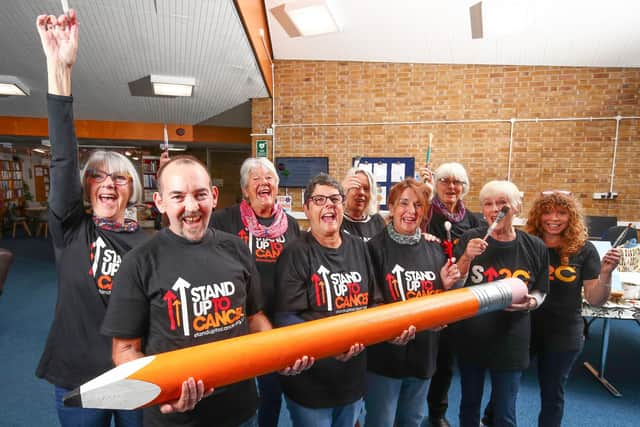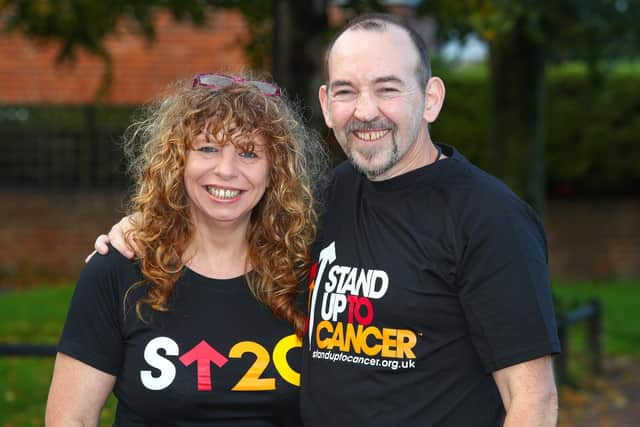Gosport father-of-three's Christmas Eve cancer diagnosis gave him the kick he needed to live his best life
and live on Freeview channel 276
Al Warner, from Gosport, now teaches across the community as well as creating his own artworks and commissions and is encouraging Portsmouth and Gosport to Stand Up To Cancer, to accelerate the life-saving research that has given him a second chance.
‘Having cancer completely changes your frame of mind. It hits you with a question you’ve never even faced before: “Am I even going to be here next week, next month, next year?”
Advertisement
Hide AdAdvertisement
Hide Ad‘Now I’m living the life I always wanted because I know how lucky I am to be here,’ says Al.


Now the 53-year-old is backing the joint national fundraising campaign from Cancer Research UK and Channel 4, to encourage others to support Stand Up To Cancer in their own way, or pick from a host of ideas to raise vital funds at work, home or school.
Al, who has been with wife Lisa for 15 years, first noticed symptoms that concerned him in May 2020 when he’d moved from Gosport to Wales.
‘I felt a sudden crippling pain on the left side of my throat. It didn't last long, but it was enough to make me think something was wrong.
Advertisement
Hide AdAdvertisement
Hide Ad‘I looked at my throat in the mirror and noticed that my left tonsil was enlarged with a few white-ish patches. I wasn't overly concerned, thinking it was probably tonsillitis, so I left it for two weeks.


‘I kept an eye on it but with no obvious change, I called the GP who called me to the surgery. It was the height of the COVID lockdown so the doctor came out to my car in all the PPE and checked my throat through the car window. She said she couldn't see any swelling or white patches but believed I probably had oral thrush and gave me some medication.
‘I felt silly for wasting her time and even though my throat continued to cause problems I just learned to live with it.
But in late November of that year, Al noticed swelling under his jaw on the same side as his painful, swollen tonsil and was suffering from intermittent earache.
Advertisement
Hide AdAdvertisement
Hide Ad‘I went back to my surgery and within 10 days I was being seen at the Ear, Nose and Throat department,’ he says.
‘A short time later I was given a CT scan and although no-one said the ‘C-word’ I had an idea of what they might be looking for.
On Christmas eve, Al still had no diagnosis but after finding himself in excruciating pain with his ear, he called the GP and soon got an answer.
‘The doctor said, "Do you know what’s wrong with you? I’m really sorry to tell you this over the phone but you have cancer.”
Advertisement
Hide AdAdvertisement
Hide Ad‘Being told that news was surreal. Although I knew it could be cancer, no-one had said they were investigating that possibility and I didn’t want to believe it until someone told me,’ Al says.
‘On Christmas Day, my brain went into a different dimension, almost to the point of disbelief. I still had no idea how serious it was and although I felt really sad, I also felt this strange happiness because I thought it might be my last Christmas and I wanted to make the most of it.
‘It was really hard telling my wife, Lisa, because she had lost a daughter to cancer a few years before we met and I feared it might be harder for her than it would be for me.
Al chose to keep the news from his two youngest daughters, 17 and 20, living with their mum in Wiltshire as he didn’t want them to worry.
Advertisement
Hide AdAdvertisement
Hide Ad‘On New Year’s Eve Lisa and I had driven to the top of a mountain overlooking the Brecon Beacons, wondering what the future would bring and I received a call from the ENT specialist and oncologist confirming that I had head and neck cancer and at what stage it was at.
‘Because it hadn’t been diagnosed earlier, it couldn’t just be removed, and it had spread to some surrounding tissue and some lymph nodes.
‘I was eventually told I needed six teeth out and a tonsil removed before I would be given chemotherapy and radiotherapy.
Al was offered cisplatin every Monday for six weeks, a chemotherapy drug that Cancer Research UK scientists helped to develop, as well as 30 sessions of radiotherapy.
Advertisement
Hide AdAdvertisement
Hide AdAfter five sessions of chemo, Al became unwell and chose to opt out of the sixth session.
Just days later, he was rushed into hospital with neutropenic sepsis which sometimes occurs when the use of chemotherapy and radiotherapy suppresses the body’s ability to respond to infection.
He spent five days in hospital before he was sent home. Al’s treatment was finally complete, but the impact of his illness was still being felt.
‘I lost all sense of taste, even water tasted awful and I also had to be fed through a tube for a period of time,’ he says.
Advertisement
Hide AdAdvertisement
Hide AdAfter visiting his daughters to tell them about his diagnosis and what he’d been going through, Al began to assess what was important to him.
‘My diagnosis gave me real time to think and re-evaluate life. We decided to move back to Gosport and my illness gave me the kick that I needed to focus on my artwork,’ he says.
As a child, friends and family thought Al would do ‘great things’ with his art, but after having a family, he became a builder and HGV driver.
‘When I lost my job back in 2010, I thought to myself, it’s now or never and tried to make a go of my artwork. I had some pieces in a gallery in Lee-on-the-Solent for a few years, began teaching and took over an art shop.
Advertisement
Hide AdAdvertisement
Hide Ad‘But in 2017 I was diagnosed with a chronic disorder of the nervous system, similar to Multiple Sclerosis which meant painting and teaching became really difficult. We sold the brand to one of my art students and gave everything up to move to Wales.
‘During that time, I kept thinking about my art and tried to use it as a form of therapy to make me stronger. It worked and I began to get better and better and really wanted to give art another go.
‘And then I was diagnosed with cancer.
‘There was a point at the beginning, especially when you’re not sure if you’re going to make it out the other side, that I thought, ‘That’s it now. It’s never going to happen.’
‘But I got through the cancer and went into remission and I felt this urge to go back and teach and paint more. On February 2nd of this year I started teaching again at the art clubs for the Art Pod Studio.
Advertisement
Hide AdAdvertisement
Hide Ad‘I’ve been tutoring courses and workshops, I did my first solo exhibition for many years, put together 15 of my artists for the Hampshire Open Studios event which ran for ten days, I’ve attended a market to sell the paintings, entered Landscape Artist of the Year and have actually painted more paintings this year than I did before I moved to Wales.
‘Every Thursday I teach at the Elson Community Library and Hub and it’s lovely to be able to give back to the community. This week we donated our art fees to Stand Up to Cancer to do our bit for the charity we’re supporting.
‘It’s because of Cancer Research UK and fundraising campaigns like Stand Up To Cancer that I’m standing here now and I really value every moment I have. It would be a crime if I didn’t do that when I’ve been fortunate enough to go into remission.
‘I’m doing more now with my artwork than I’ve ever done and we’ve even bought a motor cruiser which we’re converting into a Live Aboard because it was something we always talked about doing.
Advertisement
Hide AdAdvertisement
Hide Ad‘I’d rather leave this world trying things than leave with regrets and it’s because of people who donate their hard-earned money that give people like me the chance to live our lives and our families the chance to spend another day with us.’
2022 marks the 10th anniversary of Stand Up To Cancer in the UK. More than £93 million has been raised to date, funding 64 clinical trials and projects involving more than 13,000 cancer patients.
A trial that Alan is keen to raise awareness of is the UK-wide arm of the PATHOS trial. It is an international clinical trial that’s testing less intensive treatment options for people with throat cancer after their surgery.
There are plenty of ways people can support research through Stand Up To Cancer.
Whether fundraisers take part in a fitness fortnight, they can get sponsored to stand up all day, dress head to toe in orange or organise their own bake sale, there are lots of ways to get involved.
